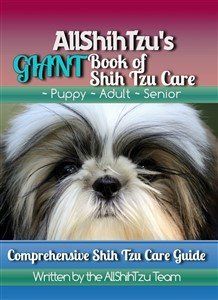Shih Tzu House Training
Overview
Please note: AllShihTzu is reader-supported. Some links below are affiliate links, meaning we may earn a small commission on products through these, at no extra cost to you.
Pre-training FAQ
Indoor vs. Outdoor House Training
4. For temporary indoor training (like during extreme cold), set up in a mudroom or attached garage. This leads your Shih Tzu away from their usual living area to a specific bathroom spot, maintaining consistency and aiding housebreaking when you return to normal conditions.
The 6 Housebreaking Prep Steps
How Often to Take a Puppy Out
To maximize housebreaking training for your Shih Tzu, ensure regular outdoor trips:
- After Waking Up: Take them out immediately after they wake up from a nap or nighttime sleep.
- Leaving Defined Area: Right after they come out of their designated area.
- Post-Meal: 20 minutes after eating a meal.
- Pre-Bedtime: 20-30 minutes before going to bed.
- Walks: Before and after every walk (to help prevent bathroom breaks during the walk).
- Age-Based Schedule: Every 2 hours for a 2-month-old, increasing the interval by an hour each month for developing bladder control.
- Immediate Reaction: If they show signs of needing to go, take them out immediately, even if it means carrying them.
Exact Instructions
How to React to Housebreaking Accidents
When following these housebreaking guidelines, your Shih Tzu should be in their playpen when unsupervised or closely monitored otherwise, minimizing accidents. However, a few mishaps can still occur. Here's how to handle them:
- Reassess if Multiple Accidents Occur: Frequent accidents may indicate the need for more time in the defined area or closer supervision.
- If you catch them in the act, interrupt gently (e.g., with a loud clap) and take them outside immediately. Praise and treat if they finish there.
- Avoid Punishment: Don't scold or punish for accidents. It's ineffective and can cause fear or anxiety.
- Proper Cleaning: Clean accident areas first with soap and water, followed by an enzyme cleanser to remove lingering odors.
- Consider Underlying Issues: Multiple accidents might suggest territorial marking or health problems, like a UTI or bladder infection.
Summary of House Training Instructions
- Prep by choosing a designated bathroom area, setting up a defined indoor area for when you can’t watch your puppy, closely monitoring your pup (using a tethering method, if needed), having a supply of training treats on hand, and choosing which cue phrase you will use.
- Plan on taking your Shih Tzu out many times a day, including whenever they wake up, after meals, and before bed.
- Use a harness and leash to bring your pup outside and remain in the potty area with them for up to 15 minutes. Give enthusiastic praise and special treat reward when they have gone pee or poo.
- Clean up any accidents with an enzyme cleanser to help prevent repeats.
Addressing Common House Training Hiccups
Shih Tzu Puppy Care Tips - A list of the most important care tips to follow if you have a Shih Tzu puppy (under the age of 1 year old)
Articles You May Like:
Shih Tzu Puppy Teething - What to expect during the teething phase, how to react to gnawing on non-toy objects and a list of helpful teething toys for pups with strong chewing urges.
Shih Tzu Dental Care - Oral health is at the top of concern for the Shih Tzu breed and all pet parents should be actively cleaning their Shih Tzu's teeth. See our top tips to keep your little guy or gal's teeth clean, to prevent infections and future tooth loss.





